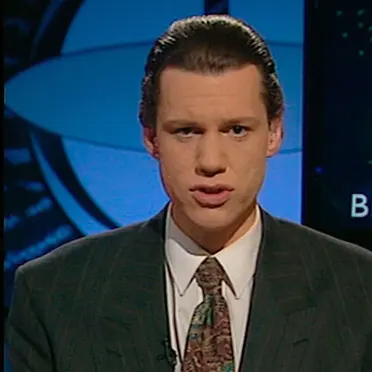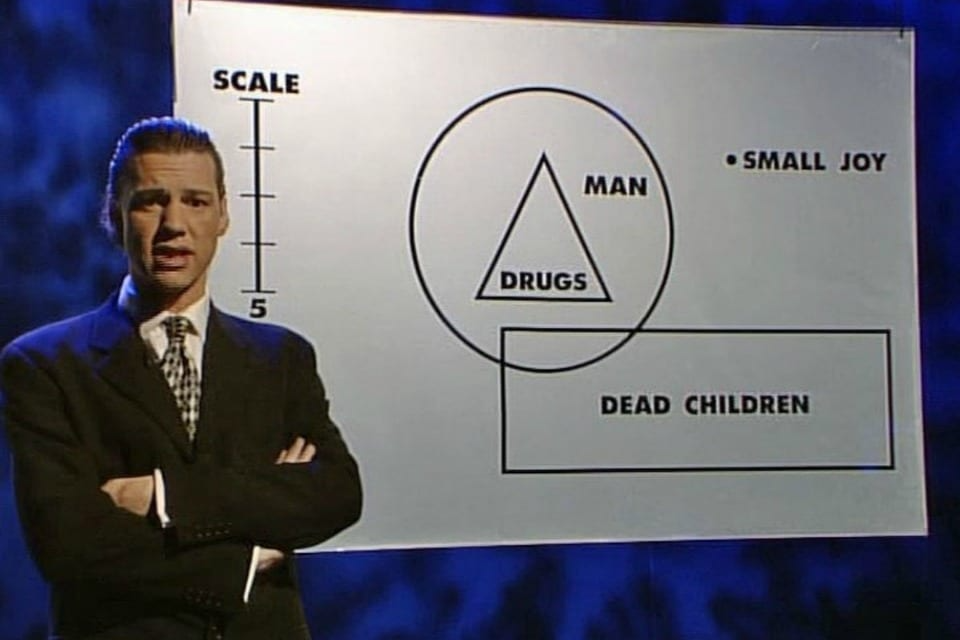Armando Iannucci and Chris Morris couldn’t find a parking space. It was August 1991, and Iannucci had invited Morris over to London from Bristol to talk about working together on a spoof radio news show Iannucci was producing. Morris had ditched his ancient Mercedes outside the Radio 1 building and needed to shift it before he got a ticket, and couldn’t find anywhere else. “So we ended up just driving for about two hours around Broadcasting House,” Iannucci says drily over the phone. “Which is kind of appropriate, I think.”
Running rings around the news was basically what they ended up doing together in On the Hour and its TV version The Day Today, the 30th anniversary of which we’re talking about. There had been loads of satire on TV before, but nothing as biting and strange as The Day Today. Anchored by Morris’ newsreader character – a mixture of Jeremy Paxman’s bark, Michael Buerke’s big sad eyes and the latter-day Nick Cave’s slicked-back hair and air of menace – The Day Today’s news team combined Rebecca Front, Doon Mackichan, David Schneider, Patrick Marber and Steve Coogan, whose Alan Partridge made his TV debut commentating on the Tour de France, being bullied by Morris and getting beaten up by judo enthusiasts.
The Day Today is still in a class of its own. Nothing had dressed up so convincingly in the news’ clothing and made it look so stupid while wearing such a straight face. It only lasted six episodes but you can pick pretty much any line at random – “Peter! You’ve lost the news!”; “Where now for man raised by puffins?”; “He must have a foot like a traction engine” – and hit gold.
The basic premise was that it’s always funnier to do something for real, whether that was digging a Fifties camera out of the National Film and Television Museum to shoot Britain’s last televised hanging or getting hold of a live tiger for a 10-second bit. “That’s one of those things where you think it's a very simple idea, very straightforward, and then someone says, ‘No, it's a live tiger.’”
As it turned out, driving around and around Piccadilly was a good way for the two to get to know each other. “We instantly clicked and we were roughly the same age,” Iannucci says. “Weirdly, we both were taught at Jesuit schools, me in Glasgow, him not. And we found out we had one or two teachers in common, because they moved them around [between schools]. I wonder why.”
The Day Today crew have all stuck together since: when we speak, Marber is directing Iannucci’s play Covid-era satire Pandaemonium at Soho Theatre and Coogan and Iannucci are readying a production of Dr Strangelove for next autumn. When they all got together in 2004 to add extra material to a DVD “it all came flooding back”.
“And then for the 20th, I think we all got together and had dinner. We might do that for the 30th.”
A lot of satire comes from frustration and anger – you’ve said before that The Thick of It was inspired in part by how angry you felt about Iraq. Is that where The Day Today comes from?
I think it's a slightly different place. I think it's more, how can we do comedy a slightly different way? Fundamentally, it’s a sketch show, but it's not – we would never sell it as a sketch show. We just sell it as a thing. And also, I think frustration at the fact that there wasn't really a show that was actually recognising that most people know how the grammar of television and radio works, and therefore you could play about much more stylistically. Added to that there is, I suppose, growing up working in the BBC – that voice of authority that you never question. So what happens when a voice of authority tells you stupid things? How quickly do you question it, or not?
Part of the prep was a BBC TV news editing course. What was that like?
Basically you've got unedited footage from the war in Bosnia. [You’re told] these are the four points in your voiceover that you need to get across, and you need to cut it down to a package that's two minutes, and you've got three hours to do it: go. I didn't have anything in the footage to cover one of the four points, so as time was running out, I just didn't put in that point. So I ended up with three points, because we had the pictures to go with the three points. And that taught me how picture-driven it is on TV news.
What was the rehearsal room like?
We were at TalkBack Productions, I think it was 33 Percy Street [in Fitzrovia]. And there was a basement there that was like a mini studio – not sophisticated, but if they wanted to do casting tapes or, you know – and we used that to improv in and we’d record the sessions. So for example, I knew we were going to do this thing about the swimming pool and this character of the security guard with all his monitors. And I remember I was being the interviewer and saying, “But somebody died?” And then Steve went, “Well, let me put it this way. See, in 1983, nobody died. In 1984, nobody died.” And the more went got on, the more we were giggling. And he did stop at one point, and we went, ‘No, carry on, carry on, carry on!’ We just thought, this is hysterical. I've no idea if this is going to be funny when we actually do it. But we have to do this. Or we would improvise different set pieces, like there was a thing set in an office and what happens if a pig is introduced. [In ‘The Office’, Patrick Marber’s radical management consultant Lester Beck arrives at a pharmaceuticals company in Windsor, where he releases a pig called Snorkel into the office to test the employees’ problem solving skills.] Actually, I didn't want them to meet the pig. I wanted to show that live, so that they didn't know where the pigs were.
Are there any details in the sketches which people tend to miss?
Two things people miss: there's a Peter O'Hanrahahanrahan where a woman walks up to a guy and punches him, and the guy just falls flat on his face. It's in the background, and no one seems to have seen that. And another thing we have is in an item, I think it's about clamping the homeless, in the background the Bureau de Change on the back of a truck goes right through in the back of the shot, with them fighting. And nobody seems to have noticed that. And there's no trickery involved, and we haven't tried to hide it or anything. It's just there, but it's funny what the eye does.
You made Knowing Me, Knowing You straight after The Day Today. Was there a sense that Partridge would go on and live a full TV life?
Well, we didn't know because he sounds like one thing on the radio, but actually Steve on the telly looked about 12. So we had to slightly poke him more toward the rookie presenter rather than the seasoned presenter, the sort who would really want to go on and do The One Show, if The One Show existed then. Where, ironically, Alan now is, I suppose, with This Time.
The War special is a highlight. Given how much war reporting we’ve seen in the last couple of years, do you see bits of The Day Today in what it’s become? Or has it shifted into something else?
Well, there was an element – I mean, Doon’s character was kicking doors down. I did see some reports with the IDF yesterday going to the hospital, all armed to the teeth and helmeted up. It probably will look quite tame now, looking at it again, I suppose. I think that was born off the back of having that first Gulf War and news agencies going, ‘Yeah, we're right up at the front here, look at us, yeah, we're going in!’ There's this funny thing at awards ceremonies where there are different categories, and when it comes to the award for best news coverage, the nominees are, you know, the shooting of 16 people in this village, the collapse of this building. And the winner is… the collapse of this building! And you just see a whole table going, ‘Yeah!’. So there's an odd kind of, ‘Are we just entertainment?’ feel to it.
Was it stressful? There are stories about the cast crowding around you chanting “Nervous breakdown! Nervous breakdown!”
Yeah. I found it very, very stressful because it was just a lot to do. On the one hand you want them to be as free and to try everything out as possible, but it's just that the more material you generate, the more work it is to then not just hone it down to 30 minutes, but hone the best of it down to 30 minutes and make sure that it's telling the story the best way you can. I think also just that experience of for the first time making a television show – and again, not a simple one, where it's a cast of five who stand in front of three sets and do the lines. It took us about a year to make the whole thing because of the different elements to it. We had a lot of pressure in turn that we gave ourselves to make it absolutely right. I'm glad I made it. But, um, I can probably see why we didn't go back and do another one.














